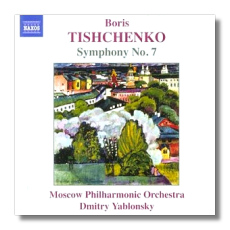
The Internet's Premier Classical Music Source
Related Links
- Latest Reviews
- More Reviews
-
By Composer
-
Collections
DVD & Blu-ray
Books
Concert Reviews
Articles/Interviews
Software
Audio
Search Amazon
Recommended Links
Site News
 CD Review
CD Review
Boris Tishchenko

Symphony #7, Op. 119
Moscow Philharmonic Orchestra/Dmitry Yablonsky
Live Recording: Grand Hall of the Moscow Conservatory – Feb. 26, 2002
Naxos 8.557013
This is a live recording, and the (it seems to me) rather bewildered applause at the end is mixed with a few enthusiastic whoops. This mixed response is appropriate, as this is one of those symphonies that doesn't know whether to laugh or cry. (Russian composers have been the master of the genre for almost the past century.) Like Shostakovich (who was his mentor, as was Galina Ustvolskaya), Boris Tishchenko, born in 1939 in Leningrad, can put opposing viewpoints in a single symphony, and still have it come out sounding like a coherent work. Nose-thumbing sarcasm and outrageousness – even bad taste – inhabit the same canvas as numbing tragedy and life-enhancing sentiments. The Seventh Symphony was written in 1994. This is its première recording.
Also like Shostakovich, Tishchenko has scored his symphony for a large orchestra, which he nevertheless uses sparingly. The wind solos in the fourth movement are highly reminiscent of Shostakovich, but not the slide whistle (!), which is a nicety of scoring I would have associated more with Alfred Schnittke or Sofia Gubaidulina. The use of a xylophone to hammer out and reinforce some of the musical ideas also speaks of Tishchenko's patrimony. The five movements are simply numbered, without any tempo indications, but the arch-like construction (odd-numbered movements bearing the most weight, even-numbered ones serving as sarcastic or pathetic intermezzos) also seems like something that he might have picked up from his mentors.
The recording was made in the Grand Hall of the Moscow Conservatory on February 26, 2002. Yablonsky (the son of classical pianist Oxana Yablonskaya), has been the orchestra's principal guest conductor for the past several years. I've heard this ensemble sound more assured than it does here (on studio recordings, anyway), but nevertheless, this is a more than passable performance of an interesting recent addition to the Russian symphonic repertoire. Excellent engineering.
Copyright © 2004, Raymond Tuttle



















